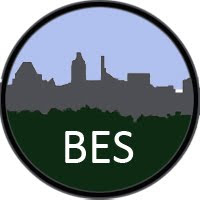This research was supported by funding from the NSF Long-term Ecological Research (LTER) Program. This material is based upon work supported by the National Science Foundation under Grant Nos. DEB-1637661 and DEB-1855277. Any opinions, findings, and conclusions or recommendations expressed in this material are those of the author(s) and do not necessarily reflect the views of the National Science Foundation.
The Baltimore Ecosystem Study has been a National Science Foundation Long Term Ecological Research (LTER) site since 1998. Visit other LTER sites.
 |
 |

BES Book of the Year — Baltimore: The Building of an American City
We have started a new tradition at BES. A book of the year is a good way to focus on some important publication relevant to everyone in the Baltimore Ecosystem […]
BES Quarterly Research Meeting: Green Infrastructure
What’s Green Infrastructure? The BES community will meet, along with managers and policy makers, on 19 April 2012 to discuss green infrastructure. The Baltimore City Office of Sustainability has provided […]
Baltimore’s Urbanite Magazine Explores Big Urban Theory
The Urbanite (www.urbanitebaltimore.com) is one of Baltimore’s cultural and intellectual treasures. Available free at many locations, or by subscription for those who don’t get to town every month, it is […]
Urban Ecology HAS Changed
A Perspective on Points from Ramalho and Hobbs, As Reported by the BBC on 6 December 2011 A news report by the BBC on an article critical of urban ecology […]
Are You an Urbanist?
Urbanists and the Old Walls The term, urbanist, originally meant someone who designed and built cities. The term is an old one, and when it was introduced into English in […]
Post-Industrial Baltimore
Baltimore is often called a “post-industrial” urban region. What set of cultural and theoretical assumptions does this label invoke? The industrial and post-industrial tag emerges from the Modernist program and […]
The Year of Adaptive Processes
The new theme for research in BES emphasizes adaptive processes as a key to understanding and working with urban sustainability. Because of its importance, the intellectual theme for BES this […]
Invitation to a Book for BES Community Members
Urban Socio-Ecological Research: Concepts, Contrasts, and Conclusions from the Baltimore Ecosystem Study Introduction This document outlines ideas for a synthesis volume for the Baltimore Ecosystem Study Long-Term Ecological Research project. […]
Ecology and Policy
Many researchers and educators are concerned that the knowledge they generate can be used by society. However, this takes active effort because policy makers and environmental managers are busy and […]
BES II Project Outcomes
What’s This All About? Second story bays, Charles Village neighborhood, Baltimore. BES LTER Photo. BES, as a Long-Term Ecological Research project, is funded in six year increments. BES II actually […]